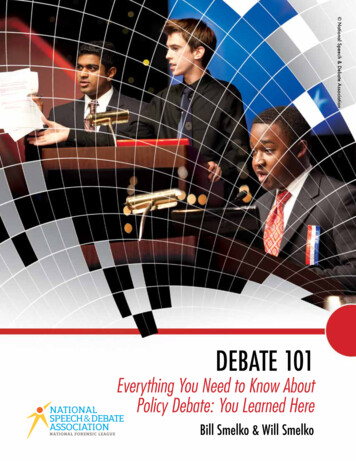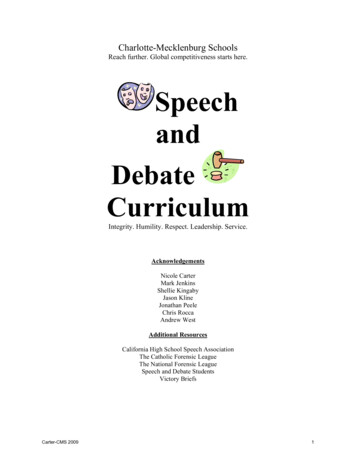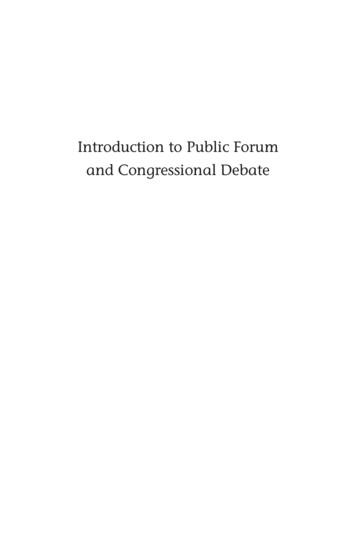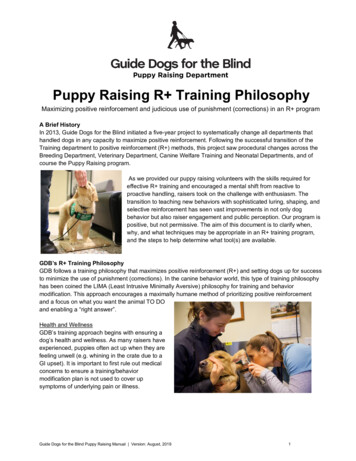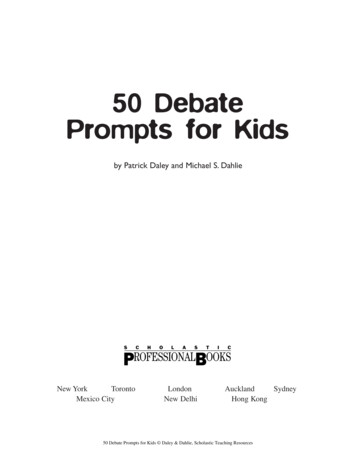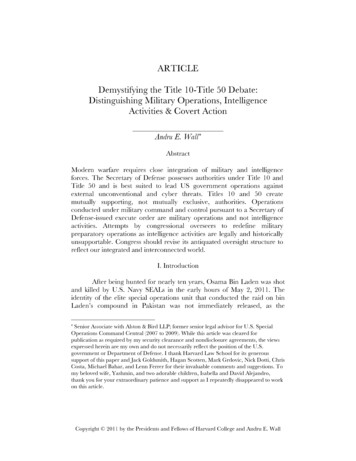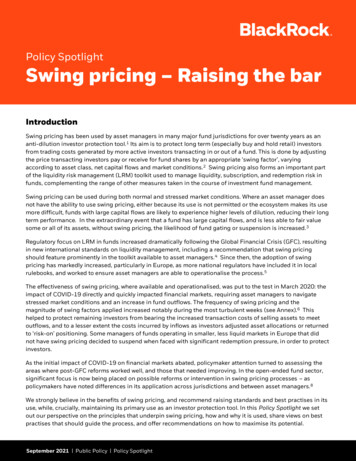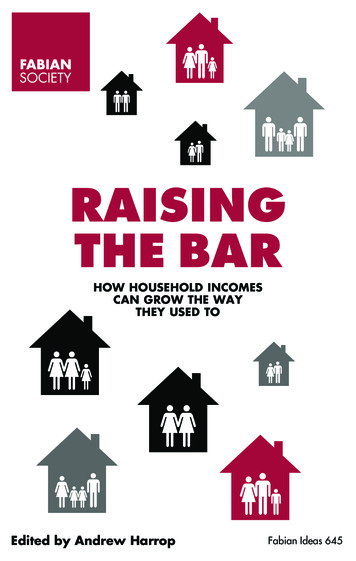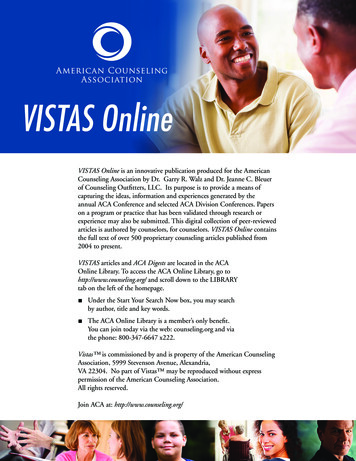
Transcription
VISTAS OnlineVISTAS Online is an innovative publication produced for the AmericanCounseling Association by Dr. Garry R. Walz and Dr. Jeanne C. Bleuerof Counseling Outfitters, LLC. Its purpose is to provide a means ofcapturing the ideas, information and experiences generated by theannual ACA Conference and selected ACA Division Conferences. Paperson a program or practice that has been validated through research orexperience may also be submitted. This digital collection of peer-reviewedarticles is authored by counselors, for counselors. VISTAS Online containsthe full text of over 500 proprietary counseling articles published from2004 to present.VISTAS articles and ACA Digests are located in the ACAOnline Library. To access the ACA Online Library, go tohttp://www.counseling.org/ and scroll down to the LIBRARYtab on the left of the homepage.nUnder the Start Your Search Now box, you may searchby author, title and key words.nThe ACA Online Library is a member’s only benefit.You can join today via the web: counseling.org and viathe phone: 800-347-6647 x222.Vistas is commissioned by and is property of the American CounselingAssociation, 5999 Stevenson Avenue, Alexandria,VA 22304. No part of Vistas may be reproduced without expresspermission of the American Counseling Association.All rights reserved.Join ACA at: http://www.counseling.org/
Suggested APA style reference: Mobley, J. A., Hall, K. R., & Crowell, J. L. (2010). Raising the bar: Thedebate over how to improve the quality of graduate counseling programs and students. Retrieved 0/Article 32.pdfArticle 32Raising the Bar: The Debate Over How to Improve the Quality ofGraduate Counseling Programs and StudentsJerry A. Mobley, Kimberly R. Hall, and Jeri L. CrowellPaper based on a program presented at the 2008 ACES Conference, October 17, SanDiego, CaliforniaMobley, Jerry A. After 25 years of counseling practice in high school alternativeschools, a United Way community agency, and private practice, Dr. Mobley hasbeen training master’s level school, rehabilitation, and mental health counselorsfor the past decade at an historically Black university (HBCU) teaching thecounseling cycle: individual, group, and family approaches. Part of thatexperience has been captured in a book, An Integrated Existential Approach toCounseling Theory and Practice (Mellen Press, 2005).Hall, Kimberly R. Dr. Hall is the school counseling program coordinator and anassistant professor in the Department of Counseling and Educational Psychologyat Mississippi State University. As a counselor educator, she has taught andsupervised school counseling students for four years and has provided over 30presentations/workshops at the local, regional, national, and international level,published several peer-reviewed articles, and received several grants related toschool counseling.Crowell, Jeri L., is an assistant professor in the School Counselor Educationprogram at Fort Valley State University in Georgia. Dr. Crowell’s training inboth mental health and school counseling is a benefit to understanding themultiple roles expected of professional school counselors in the field. Herexpertise is in ecological counseling as represented in her book (with Conyne &Newmeyer, 2008), Group Techniques: How to Use Them More Purposefully,which has been recognized as a practical combination of group work andecological counseling, and in applications of Reality Therapy/Choice Theory.Discussions around graduate admissions processes have been scattered throughoutthe literature (Hollis & Dodson, 2000; Jacobson, 1993; Lyons & Calicchia, 2008;Markert & Monke, 1990; Smaby, Maddux, Richmond, Lepkowski, & Packman, 2005).This article presents a mock debate in which the issue of ―raising the bar,‖ or increasingthe requirements on admission for the students into two master’s school counseloreducation programs was explored between two institutions at the 2009 ACES conferencein San Diego, California. The debate was structured in line with the International DebateEducation Association (n.d.). The debaters were from Mississippi State University
Ideas and Research You Can Use: VISTAS 2010(MSU; a Research One university and predominantly White institution [PWI]),represented by Dr. Kimberly Hall, program coordinator of the School Counselingprogram, and from Fort Valley State University (FVSU; a land-grant historically Blackcollege or university [HBCU]) in Georgia, represented by the interim program chair ofthe School Counselor Education program, Dr. Jerry Mobley. The moderator was Dr. JeriCrowell, assistant professor in the School Counselor Education program, also fromFVSU.The debate began with each presenter making an opening statement about whatled them to consider ―raising the bar.‖JC:I will allow both presenters 5 minutes to make an opening statement about whatled them to consider making the admissions standard more stringent. We will alternatewho goes first but will begin, ladies first, with Dr. Hall.KH: Thank you for the opportunity to be with you and share these important ideas. Asthe 2008-2009 school year was looming on the horizon, my administration expressed aconcern about the quality of the graduates from our program and highly encouraged us tostick to our admission standards as much as possible. Our standards required anundergraduate GPA of 3.0 (on the last 60 hours of undergraduate work) and encouragedGRE scores of 800 or higher. However, over the past several years, many of the studentswe admitted fell below those standards. As a result, several students were unable to passcomprehensive exams or licensure exams and performed marginally in the classroom aswell as during practicum/internship.In 2008, we adhered to our standards and only selected students who met both theGPA and the GRE standards. Our class was smaller that year—we only had 9 students,compared to previous years, when we accepted 15-20. These candidates are beginningtheir second year in the program and will be discussed in detail as we continue. Overall,they have been excellent students and are becoming excellent counselors.JC:Thank you, Dr. Hall. (Please hold your questions until both parties havepresented.) Dr. Mobley, what happened at Fort Valley State University?JM: I appreciate the opportunity to tell our story and explore these ideas with you. Anew dean had been brought in to rebuild our College of Education and Teacher Educationprogram; I was tasked with rebuilding school counselor education. While we hadproduced some excellent graduates in previous years, we also produced some veryminimal performers, and we did not do well at gatekeeping the training process. Thedean, Dr. Judy Carter, presented a new standard to us: ―I don’t care if they have a 4.0, doyou want your child or grandchild taught or counseled by them?‖ My job was to come upwith a method for implementing that standard.Remember, as an HBCU, we attract a predominantly African American studentbody and most of the standardized tests like the GRE and MAT do not adequately reflectthe abilities of minorities and lower SES people (Fields, 1998) and these tests do notmeasure the qualities you want in a counselor (see discussion below). Take GPA for anexample: a colleague of mine, who now has a doctorate and teaches in college,experienced several family upheavals while she was in school and performed poorly for2
Ideas and Research You Can Use: VISTAS 2010over a year as a result. As she and her family stabilized, she returned to doing excellentwork. She none-the-less had several low GPA semesters that lowered her overall GPA.Even when the poor performance was self-inflicted, if they began to do better, you have aperson who might contribute more as a counselor than someone who had alwaysperformed well. We are training counselors, not brain surgeons. Their GPA often doesnot indicate what occurred—to the contrary, it possibly eliminates them from futureopportunities. And now the standard is higher than just academics.JC:Thank you, Dr. Mobley. Since standardized testing seems to be part of thisdiscussion, maybe we should take a minute and compare each schools’ assumptionsabout, and experiences with, the GRE and/or the MAT. Dr. Hall back to you.KH: Effective selection and training of counseling graduate students is critical to thesuccess of the field. Failure to admit quality students only weakens the field. Manyuniversities require the GRE prior to admission, and the most highly competitiveuniversities have high minimum score requirements (Norcross, Hanych, & Terranova,1996). With the mandate for increased accountability, counselor education programs havebeen asked to document outcome measures for their students. Both the Council forAccreditation of Counseling and Related Educational Programs (CACREP, 2008) andregional college associations, such as the Commission on Colleges of the SouthernAssociation of Colleges and Schools (2008) require documentation of effective programs.One of the primary measures of effective programs is student success on comprehensiveexams. Our students complete the Counselor Preparation Comprehensive Examination(CPCE) for their comprehensives. A recent study (Schmidt, Homeyer, & Walker, 2009)revealed that undergraduate GPAs, GRE-V, and GRE-Q scores were predictive of studentsuccess on the CPCE. They found that the GRE-V was the most significant predictor ofnot only the CPCE-Total scores, but also of each of the eight CPCE subscale scores.Because counseling is verbal in nature, this result is not surprising. Limitations in verbalcommunication skills can obviously lead to problems in the counseling setting. Otherstudies have also concluded that GRE scores were valid predictors of success in graduateschool. For example, a study conducted by Kuncel, Hezlett, and Ones (2001) found thatGRE scores were valid predictors of graduate GPA, comprehensive exam scores, andfaculty ratings. Furthermore, their study indicated that prior criticisms of the GRE’svalidity as situationally specific were in error. Becoming a competent, effective schoolcounselor requires more than just counseling skills; students must be able to coordinateschool-wide counseling programs, master knowledge related to warning signs andeffective interventions for mental distress in children, and quickly problem-solve toeffectively help preK-12 students and their families.JC:Thank you, Dr. Hall. Dr. Mobley, what specifically is your understanding ofstandardized tests and the GRE and MAT?JM: In their article Schmidt, Homeyer, & Walker (2009) also vigorously assert, ―[T]heliterature is discordant regarding the effectiveness of using GRE score as a predictor ofsuccess in graduate studies‖ (p. 227). I agree with Dr. Hall that the verbal part of the GREdoes correlate significantly with the MAT (Meagher, 2008) and seems to predict first3
Ideas and Research You Can Use: VISTAS 2010year performance in graduate studies (Sampson & Boyer, 2001), but I have two concerns:1) GRE and MAT do not do well at predicting personal growth (Stone & Hanson, 2002)and performance of counseling skills (Smaby et al., 2005), and 2) these limitationsparticularly penalize minorities (Sampson & Boyer, 2001). Sedlacek (2003) joinedSackett, Schmidt, Ellingson, & Kabin (2001) in saying, ―My point here is to illustrate thata variety of measurements may be needed to achieve equitable assessments for all toincrease ethnic diversity, one should not be limited to cognitive measures alone‖ (¶ 12).One of the more elaborate studies looking at the GRE, graduate performance, andminorities (Sampson & Boyer, 2001) began their report by saying, ―Its [the GRE’s]usefulness in predicting minority students’ success in graduate education has not beenestablished without equivocation‖ (¶ 4 ) and conclude emphatically stating, ―GRE scoreswere less predictive of success in the first year of graduation for non-traditional agewomen and minorities, yet decisions about whether to admit minority students heavilyrely on GRE scores‖ (¶ 17 ). Counselor education programs need to consider ―otherfactors‖ (¶ 18).What has been recommended (Johnson & Gentry, 2000) in addition to thetraditional tests has been portfolios, written statements of purpose for applying orpersonal philosophy, research projects, publications, and productivity in other areas. Ourprocess requires MAT or GRE scores and undergraduate GPAs but predominantlydecides to advance students in the program based upon a semester-long performance on awriting rubric, research rubric, and disposition rubric.JC:For the next part of our ―debate,‖ both presenters will be given 10 minutes each toexplain how they use standardized tests, grade point averages, and other things inadmitting candidates into their programs. Dr. Mobley, we’ll begin with you.JM: In the CoE [College of Education] we had for some time been struggling withperformance measures, rubrics, for a variety of candidate skills. Replicating and adaptingwhat the undergraduate teacher education program was doing, we developed eightoutcome measures. Here’s how we applied them for admission.We arranged a semester-long interview process that culminated in the applicationof three of the eight rubrics. With the support of the Dean of Graduate Studies andContinuing Education, we have begun to do what is now called ―fast track‖ admissions,which allows students to have a semester of graduate school (up to 9 hours) prior to fulladmission to Graduate Studies with financial aid. In some situations this allowscandidates to complete their admissions packet including references and GRE and MATtest scores. During their courses each professor completes the disposition rubric twice, awriting rubric in the scripted Career Counseling course on a summary of their careerinformation on themselves, and a research rubric in the Fundamentals of Research Designcourse where they present a PowerPoint proposal of research they will complete duringtheir program.Most of the class performed well. While they complained that they did not receivethe highest ratings on every scale, they were more than adequate. An assessment isentered into LiveText where it can be accessed by the student to go into their portfolio oraggregated to describe what happened during the semester.4
Ideas and Research You Can Use: VISTAS 2010Their performance, what they do in these courses, how they respond to each otherand their professors, and their ability to rate well on the rubrics was strategized to bemore valuable than their undergraduate GPA and GRE or MAT scores. The standardizedtest scores could be used diagnostically to determine who would need coaching for thecomprehensive exam and state certification test.JC:Thank you, Dr. Mobley. You have 10 minutes, Dr. Hall.KH: At MSU, all students must submit their transcripts, GRE scores, letters ofreference, and a statement of purpose as part of their application procedures. Then eachprogram area within the department meets to review the applicants. During this meeting,we discuss people’s scores, letters, and the reason they are entering the program (basedon their statement of purpose), as well as any prior work experiences. From thisdiscussion, a decision is made to either accept the student outright, accept the studentprovisionally, or reject the student. If a student is accepted provisionally, then they haveto make a grade of B or higher on their first 9 hours. If they make a C or lower, then theyare immediately dismissed from the program. We also have a policy that students are notallowed to make more than two Cs in the program, or any grade lower than a C. If theymake a third C, or one D or F, then they are dismissed from the program.Prior to 2008, we had several students who were dismissed from the programbased on academics (made a third C, D, or F) and two who could not pass comps or thePRAXIS II. Of these three students, two were great with children and indeed had apassion for helping others; however, professors indicated that all of them were marginalstudents as well as counselors. They did not demonstrate the ability to critically analyzesituations that clients presented to them and often struggled with providing direction inthe counseling session.Since 2008, all of our students have made grades of B or higher in all of theircoursework (with mostly As). Professors have commented on how well students haveperformed in the classroom, and their Skills professor spoke highly of their ability toprovide counseling. They are currently completing their practicum, which is 600 hours, ina K-12 setting, and I have heard nothing but praise from all of their site supervisors andadministrators. Many of them are quite strong in advocating though, so we’ve had to talkabout timing and the right way to say things but few of our students before trulyadvocated for their role as a school counselor. I have been extremely pleased with thisclass and think they will become excellent school counselors.JC:Thank you, Dr. Hall. While we will go into some case study examples of howeach of these processes has worked on the next round. Does anyone in the audience havea question for either or both presenters?JC:The next presentation is to present two case studies each, one relative success andone relative failure, that can be directly connected to the admission process. You have 10minutes each, and we’ll begin with Dr. Hall.KH: While I think all of our current students are ―successes,‖ I do have one that reallystands out. She’s an African American student, who embodies the idea of a ―perfect‖5
Ideas and Research You Can Use: VISTAS 2010school counselor in my mind. She goes above and beyond in all classroom assignments,works perfectly as a group member, and really relates to children. She began herpracticum at an elementary school that had never had a school counselor until this year,and then that school counselor was out on maternity leave during the first six weeks ofschool. Lakeisha hit the ground running. She began developing a comprehensive schoolcounseling program by forming an advisory board, developing a school counselingmission statement, designing and administering a needs assessment, and forming anaction plan for the year. She worked with parents and teachers by designing interventionsthat could be used at home and at school. She has really proven herself to be exceptional.I don’t really have an example for this year of a ―failure,‖ but I can see how GPAand GRE scores don’t necessarily mean that the person will be a great counselor. To helpwith this, our department meets twice a year to discuss each student. We discuss not onlytheir academic performance but also their dispositions. At this point, if any facultymember perceives that a student would not be a good fit for the counseling profession,then the advisor meets with that student to discuss the issue and a note goes into thestudent’s file. If the student continues to display the same behaviors over the nextsemester, then the faculty will discuss the possibility of encouraging the student to seek adifferent profession, or if severe enough, will recommend that the student be dismissed.We have done this in the past for some of our school counseling students, but have nothad to do so over the last year.JC:Thank you, Dr. Hall. Continue to hold your questions until we have presentedboth perspectives. Dr. Mobley, you have 10 minutes.JM: I have had many students in the last year who are excellent students and wouldprobably be successes regardless of what we did, but the only male in our program lastyear is a particular success in my mind. (He has given me permission to talk about himbecause it would be difficult to obscure his identity.) He would not have gotten into manygraduate programs with his undergraduate GPA of 2.42—we require 2.70— and MATscore of 38—we require 48. He was quiet in his first semester in the course, but he wasresponsive to feedback. He said at one point, ―I see that this is going to be a total makeover—you are going to review everything.‖ And he rose to the challenge. I found phrasesthat he would write that were elegant but often obtuse and encouraged him to build on theconcepts but get the language right. He has worked hard; he has succeeded. This attitudeof working hard, learning and growing, overcoming personal and other obstacles makeshim the sort of person, let alone counselor, that I would like my children andgrandchildren to have as a counselor.We also have a student who minimally passed the rubrics and indicatedconsiderable basis for concern. (She has given me permission to talk about her because itwould also be difficult to obscure her identity.) She wrote well, but she did not talk. If shewas called on, she would respond minimally. We decided to maintain her in the program,but since school counseling is a leadership position requiring verbal engagement, weplaced her on a contract; we insisted that she assert herself. When she no substantialchange occurred in her second semester, we asked her to take a semester off and work onthe skills we were asking her to develop, e.g., speaking up -- particularly using activelistening, I-messages, and the four-step process of Reality Therapy. She might also need6
Ideas and Research You Can Use: VISTAS 2010to do something ―to address whatever might be hindering her‖ from demonstratinginitiative; ―counseling might be useful.‖ These deficiencies would have been lessnoticeable without the performance measures, but with them the deficits demandedattention.She has returned from her semester off and is doing better. She was in counselingover the summer. She agreed to audit the skills/theory class and has become an informalleader in that class. The faculty consensus of her performance is positive and her rubrics,particularly her Disposition rubric, has no deficits.JC:Now that you have admitted two classes and gathered all of this information.What do you think you need to do differently? Dr. Hall?KH: In 2008, we really stuck hard to our standards and did not admit any studentsprovisionally. So if they didn’t meet both standards then they were rejected. This fall, wehave lightened up a bit and admitted several provisionally, which means they have tomake a grade of B or higher in their first 9 hours. Faculty believed that perhaps somestudents could prove themselves in the first 9 hours and overcome a lower GRE score orlower GPA. Students who were admitted provisionally, however, either had a lower GPAor a lower GRE score, but not both.JC:Dr. Mobley, what might you do differently?JM: Communication is probably the most important thing since the process we areusing is different. We have an orientation before classes begin and repeatedly explainwhat the expectations are; we have them apply the disposition rubric to us and let themknow that they will need to score at least a ―2‖ on all of the items. But we need to domore.The transparency of the process is also essential. The plan has been to useLiveText to compile and aggregate our data and is integral to the process. They entermaterials into the system, we evaluate them in the system, the materials and assessmentsare inventoried there, and the program aggregates the data for reporting purposes.Students can enter LiveText and see how they are doing at any point. Getting the rubricsinto LiveText has taken far longer than we would have ever guessed and has caused moretrouble than anticipated. We hope this semester will see us getting everything up to date.Alignment of the faculty inside the program and the program to the college areongoing issues. Different perspectives around the rubrics and the measurement processmake for stimulating conversations, and an annual review of the entire college’sprocesses keeps the process fresh and focused.Better execution. The magic is in the details. Just do it better.JC:Thank you, Dr. Hall and Dr. Mobley. And thank you audience for time wellspent.7
Ideas and Research You Can Use: VISTAS 2010ReferencesCommission on Colleges of the Southern Association of Colleges and Schools. (2008).The principles of accreditation: Foundations for quality enhancement. Retrievedfrom tation.pdfCouncil for Accreditation of Counseling and Related Educational Programs p://67.199.126.156/doc/2009%20Standards.pdfFields, C. (1998). It's not rocket science - finding African American undergraduates forgraduate study in science – includes related articles. Black Issues in om/p/articles/mi m0DXK/is n3 v15/ai 20496442/pg 2/?tag content;col1Hollis, J. W. & Dodson, T. A. (2000). Counselor preparation (10th ed.). Philadelphia:Accelerated son, R. L. (March, 1993). Critics say Graduate Record Exam does not measurequalities needed for success and is often misused. The Chronicle of HigherEducation, 27-28.Johnson, A., & Gentry, M. (2000). Admission portfolio for a graduate program: Matchingpractice and paradigm. Retrieved from http://www.questia.com/Kuncel, N. R., Hezlett, S. A., & Ones, D. S. (2001). A comprehensive meta-analysis ofthe predictive validity of the Graduate Record Examinations: Implications forgraduate student selection and performance. Psychological Bulletin, 127, 162181.Lyons, C., & Calicchia, J. (2008). Admission requirements in counselor educationprograms: Traditions and trends. ACES Spectrum, 69, 24-27.Markert, F. & Monke, R. H. (1990). Changes in counselor education admissions criteria.Counselor Education & Supervision, 30, 48‐7.Meagher, D. (2008). Miller analogies test: Predictive validity study, general report. SanAntonio, Texas: NCS Pearson.Norcross, J. C., Hanych, J. M., & Terranova, R. D. (1996). Graduate study in psychology:1992-1993. American Psychologist, 51, 631-643.Sackett, P., Schmidt, N., Ellingson, J., & Kabin, M. (2001). High-stakes testing inemployment, credentialing, and higher education: Prospects in post-affirmativeaction world. American Psychologist, 56, 302-318.Sampson, C., & & Boyer, P. (2001). GRE scores as predictors of minority students’success in graduate study: An argument for change. Retrieved fromhttp://www.questia.com/Schmidt,E., Homeyer, L., & Walker, J. (2009) Counselor preparation: Predictors ofsuccess on the Counselor Preparation Comprehensive Examination. CounselorEducation & Supervision, 48, 226-238.Sedlacek, W. (2003). Alternative admission and scholarship selection measures in highereducation. Retrieved on 10/30/2009 from http://www.questia.com/8
Ideas and Research You Can Use: VISTAS 2010Smaby, M. H., Maddux, C. D., Richmond, A. S., Lepkowski, W. J., & Packman, J.(2005). Academic admission requirements as predictors of counseling knowledge,personal development, and counseling skills. Counselor Education & Supervision,45(1), 43‐57.Stone, C., & Hanson, C. (2002). Selection of school counselor candidates: Futuredirections at two universities. Counselor Education and Supervision, 41,175(18).Retrieved from http://www.questia.com/Note: This paper is part of the annual VISTAS project sponsored by the American Counseling Association.Find more information on the project at: http://counselingoutfitters.com/vistas/VISTAS Home.htm9
This article presents a mock debate in which the issue of ―raising the bar,‖ or increasing the requirements on admission for the students into two master's school counselor education programs was explored between two institutions at the 2009 ACES conference in San Diego, California.
